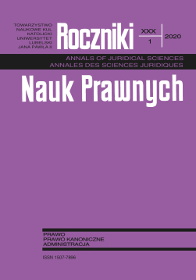Framework Agreement Between The Holy See and The Republic of Burundi of 6 November 2012 on Mutual Interest as a Tool of Inculturation on the African Continent
Abstract
Among quite a long catalogue of agreements concluded by the Holy See with African states after the Second Vatican Council there is the framework agreement (Accord-cadre) on mutual interest (sur matières d’intérêt commun) concluded on 6 November 2012 with the Republic of Burundi. The treatise consisting of the preamble, 22 articles and the annex regulates a wide range of matters of interest to both parties. Apparently it is a considerable instrument aimed at mutual dialogue of the culture and faith, which enriches both parties.
The preamble of the agreement composed of seven paragraphs features the objective, rationale and circumstances of its conclusion. The arrangements included in particular articles of the Frame- work Agreement deal with the following issues: general matters, exercise of the God’s cult, church nominations, crimes committed by the clergy and members of religious orders, the secret of confession and professional secret, material goods of ecclesiastical legal persons and the clergy, sacral and church buildings, the use of the mass media by the Church, marriage, congregating of the faithful, running educational and fostering facilities by the Church, running charitable institutions by Church, the state’s financial contribution in the activities pursued by the Church for the nation, ministerial care over persons engaged in armed and security forces and over persons staying in closed facilities and institutes, final provisions.
It should be hoped that while bridging the differences between the Church and country’s tribal culture the agreement of the Holy See and the Republic of Burundi will become to some extent and effective tool of inculturation on the African continent.
References
Annuario Pontificio, Città del Vaticano: Libreria Editrice Vaticano 2006.
Budzisz Marian: Burundi, w: Encyklopedia Katolicka, t. II, Lublin: Towarzystwo Naukowe KUL 1976, kol. 1230-1231.
Burundi, [w:] Encyklopedia Gazety Wyborczej, t. III, Kraków [b.w.r.w.].
Góralski Wojciech: Gwarancje wolności religijnej w konkordacie między Stolicą Apostolską i Republiką Zielonego Przylądka, Opolskie Studia Administracyjno-Prawne 13 (2015), nr 4, s. 77-95.
Góralski Wojciech: Wzajemne relacje Kościoła katolickiego i i państwa w konwencji między Stolicą Apostolską i Republiką Gwinei Równikowej, Przegląd Prawa Wyznaniowego 7 (2015), s. 25-40.
Halemba Andrzej: Zagadnienie inkulturacji w Afryce w okresie powstania Orędzia „Africae terrarum” Pawła VI, Śląskie Studia Historyczno-Teologiczne 25-26 (1992-1993), s. 69-98.
Iwaka Kitambala Hilaire: Les doits de l’homme en RD Congo et la geopolitique de l’integration dand les Pays de Grand Lacs. Une étude juridique de la contribution de l’ONU et de l’Eglise, Roma: Pontificia Università Lateranense 2012.
Kazina Ida-Marie: Proposition pour une pastorale familiale au Burundi, Au Coer de l’Afrique 1-2 (2002), s. 36-175.
Mwaniki Joseph R.: Odrodzenie Afryki podczas pontyfikatu Jana Pawła II, [w:] 40-lecie wyboru Karola Wojtyły na papieża. Czy pontyfikat Jana Pawła II zmienił świat?, red. P. Skibiński, Warszawa: Centrum Myśli Jana Pawła II 2018, s. 128-158.
Ndikumasabo Joseph: Paix et justice et éducation à ses valeurs du Burundi à la lumière des messages ponificaux pour la Journée mondiale de la paix, Roma: Università Pontificia Salesiana 2004.
Republika Burundi, [w:] https://encyklopedia.interia.pl/geografia-nauki-pokrewne/panstwa/news-burundi,nId,2010934#utm_source=paste&utm_medium=paste&utm_campaign=other [dostęp: 19.03.2020].
Vecchi Fabio: Il concordato del 2012 tra la Santa Sede e la Repubblica del Burundi alla prova di un’inculturazione che precede il dirito alla libertà religiosa, Ius Ecclesiae 30 (2018), nr 2, s. 571-591.
Copyright (c) 2020 Roczniki Nauk Prawnych

This work is licensed under a Creative Commons Attribution-NonCommercial-NoDerivatives 4.0 International License.


